formerly eScholarship Editions


|
|
|
|
Your search for
'Philosophy' in subject
found 102 book(s). | Modify Search | Displaying 81 - 100 of 102 book(s) | |
| 81. | 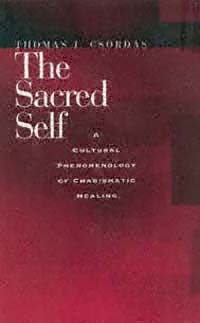 | Title: The sacred self: a cultural phenomenology of charismatic healing Author: Csordas, Thomas J Published: University of California Press, 1997 Subjects: Anthropology | Religion | Philosophy Publisher's Description: How does religious healing work, if indeed it does? In this study of the contemporary North American movement known as the Catholic Charismatic Renewal, Thomas Csordas investigates the healing practices of a modern religious movement to provide a rich cultural analysis of the healing experience. This is not only a book about healing, however, but also one about the nature of self and self- transformation. Blending ethnographic data and detailed case studies, Csordas examines processes of sensory imagery, performative utterance, orientation, and embodiment. His book forms the basis for a rapprochement between phenomenology and semiotics in culture theory that will interest anthropologists, philosophers, psychologists, physicians, and students of comparative religion and healing. [brief] Similar Items |
| 82. | 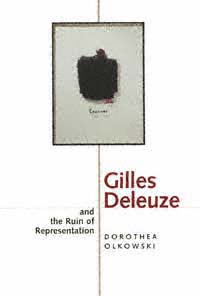 | Title: Gilles Deleuze and the ruin of representation Author: Olkowski, Dorothea Published: University of California Press, 1999 Subjects: Philosophy | Art Theory Publisher's Description: Dorothea Olkowski's exploration of the philosophy of Gilles Deleuze clarifies the gifted French thinker's writings for specialists and nonspecialists alike. Deleuze, she says, accomplished the "ruin of representation," the complete overthrow of hierarchic, organic thought in philosophy, politics, aesthetics, and ethics, as well as in society at large. In Deleuze's philosophy of difference, she discovers the source of a new ontology of change, which in turn opens up the creation of new modes of life and thought, not only in philosophy and feminism but wherever creation is at stake.The work of contemporary artist Mary Kelly has been central to Olkowski's thinking. In Kelly she finds an artist at work whose creative acts are in themselves the ruin of representation as a whole, and the text is illustrated with Kelly's art. This original and provocative account of Deleuze contributes significantly to a critical feminist politics and philosophy, as well as to an understanding of feminist art. [brief] Similar Items |
| 83. | 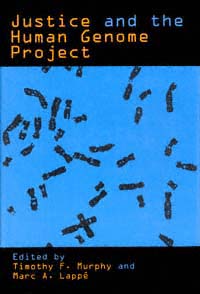 | Title: Justice and the human genome project Author: Murphy, Timothy F 1955- Published: University of California Press, 1994 Subjects: Philosophy | Ethics | Biology | Medicine Publisher's Description: The Human Genome Project is an expensive, ambitious, and controversial attempt to locate and map every one of the approximately 100,000 genes in the human body. If it works, and we are able, for instance, to identify markers for genetic diseases long before they develop, who will have the right to obtain such information? What will be the consequences for health care, health insurance, employability, and research priorities? And, more broadly, how will attitudes toward human differences be affected, morally and socially, by the setting of a genetic "standard"?The compatibility of individual rights and genetic fairness is challenged by the technological possibilities of the future, making it difficult to create an agenda for a "just genetics." Beginning with an account of the utopian dreams and authoritarian tendencies of historical eugenics movements, this book's nine essays probe the potential social uses and abuses of detailed genetic information. Lucid and wide-ranging, these contributions will provoke discussion among bioethicists, legal scholars, and policy makers. [brief] Similar Items |
| 84. | 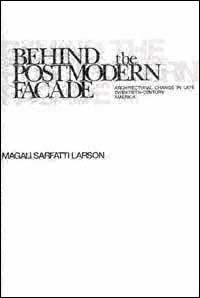 | Title: Behind the postmodern facade: architectural change in late twentieth-century America Author: Larson, Magali Sarfatti Published: University of California Press, 1993 Subjects: Architecture | Architecture | Philosophy | Politics | American Studies | Sociology | Social Theory Publisher's Description: Magali Larson's comprehensive study explores how architecture "happens" and what has become of the profession in the postmodern era. Drawing from extensive interviews with pivotal architects - from Philip Johnson, who was among the first to introduce European modernism to America, to Peter Eisenman, identified with a new "deconstructionist" style - she analyzes the complex tensions that exist between economic interest, professional status, and architectural product. She investigates the symbolic awards and recognition accorded by prestigious journals and panels, exposing the inner workings of a profession in a precarious social position. Larson captures the struggles around status, place, and power as architects seek to redefine their very purpose in contemporary America.The author's novel approach in synthesizing sociological research and theory proposes nothing less than a new cultural history of architecture. This is a ground-breaking contribution to the study of culture and the sociology of knowledge, as well as to architectural and urban history. [brief] Similar Items |
| 85. | 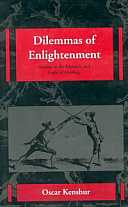 | Title: Dilemmas of enlightenment: studies in the rhetoric and logic of ideology Author: Kenshur, Oscar 1942- Published: University of California Press, 1993 Subjects: Philosophy | Social and Political Thought | Literary Theory and Criticism | European History Publisher's Description: Oscar Kenshur combines trenchant analyses of important early-modern texts with a powerful critique of postmodern theories of ideology. He thereby contributes both to our understanding of Enlightenment thought and to contemporary debates about cultural studies and critical theory.While striving to resolve "dilemmas" occasioned by conflicting intellectual and political commitments, seventeenth- and eighteenth-century writers often relied upon ideas originally used by their enemies to support very different claims. Thus, they engaged in what Kenshur calls "intellectual co-optation." In exploring the ways in which Dryden, Bayle, Voltaire, Johnson, and others used this technique, Kenshur presents a historical landscape distinctly different from the one constructed by much contemporary theory. [brief] Similar Items |
| 86. | 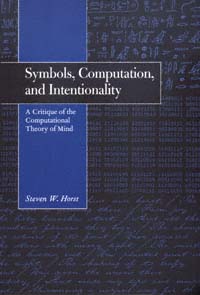 | Title: Symbols, computation, and intentionality: a critique of the computational theory of mind Author: Horst, Steven W 1960- Published: University of California Press, 1996 Subjects: Philosophy | Social and Political Thought | Psychology Publisher's Description: The computational theory of mind - the belief that the mind can be likened to a computer and that cognitive states possess the generative and compositional properties of natural languages - has proven enormously influential in recent philosophical studies of cognition. In this carefully argued critique, Steven Horst pronounces the theory deficient. He refutes its claims and assumptions, particularly the assertion that symbolic representations need not have conventional meaning. Horst goes on to sketch a new methodology for looking at the philosophy of psychology, one that provides a more fruitful way of comparing computational psychology with rival views emerging from connectionism and neuroscience. Original and comprehensive, his book is certain to provoke controversy and stimulate debate. [brief] Similar Items |
| 87. | 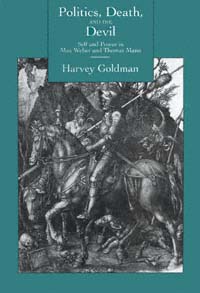 | Title: Politics, death, and the devil: self and power in Max Weber and Thomas Mann Author: Goldman, Harvey Published: University of California Press, 1992 Subjects: Sociology | Social Theory | European History | Literary Theory and Criticism | Political Theory | Philosophy Publisher's Description: This sequel to Harvey Goldman's well-received Max Weber and Thomas Mann continues his rich exploration of the political and cultural critiques embodied in the more mature writings of these two authors. Combining social and political thought, intellectual history, and literary interpretation, Goldman examines in particular Weber's "Science as a Vocation" and "Politics as a Vocation" and Mann's The Magic Mountain and Doctor Faustus .Goldman deals with the ways in which Weber and Mann sought an antidote to personal and cultural weakness through "practices" for generating strength, mastery, and power, drawing primarily on ascetic traditions at a time when the vitality of other German traditions was disappearing. Power and mastery concerned both Weber and Mann, especially as they tried to resolve problems of politics and culture in Germany. Although their resolutions of the problems they confronted seem inadequate, they show the significance of linking social and political thought to conceptions of self and active worldly practices.Trenchant and illuminating, Goldman's book is essential reading for anyone interested in political theory, social thought, and the intellectual history of Germany. [brief] Similar Items |
| 88. | 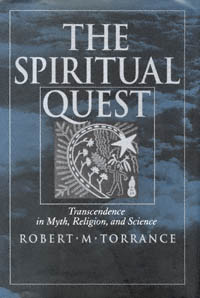 | Title: The spiritual quest: transcendence in myth, religion, and science Author: Torrance, Robert M. (Robert Mitchell) 1939- Published: University of California Press, 1994 Subjects: Religion | Indigenous Religions | Cultural Anthropology | Folklore and Mythology | Language and Linguistics | Philosophy | History and Philosophy of Science | Literature Publisher's Description: Robert Torrance's wide-ranging, innovative study argues that the spiritual quest is rooted in our biological, psychological, linguistic, and social nature. The quest is not, as most have believed, a rare mystical experience, but a frequent expression of our most basic human impulses. Shaman and scientist, medium and poet, prophet and philosopher, all venture forth in quest of visionary truths to transform and renew the world.Yet Torrance is not trying to reduce the quest to an "archetype" or "monomyth." Instead, he presents the full diversity of the quest in the myths and religious practices of tribal peoples throughout the world, from Oceania to India, Africa, Siberia, and especially the Americas. In theorizing about the quest, Torrance draws on thinkers as diverse as Bergson and Piaget, van Gennep and Turner, Pierce and Popper, Freud, Darwin, and Chomsky. This is a book that will expand our knowledge - and awareness - of a fundamental human activity in all its fascinating complexity. [brief] Similar Items |
| 89. | 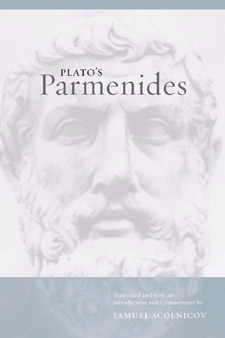 | Title: Plato's Parmenides Author: Plato Published: University of California Press, 2003 Subjects: Classics | Philosophy | Classical Philosophy Publisher's Description: Of all Plato's dialogues, the Parmenides is notoriously the most difficult to interpret. Scholars of all periods have disagreed about its aims and subject matter. The interpretations have ranged from reading the dialogue as an introduction to the whole of Platonic metaphysics to seeing it as a collection of sophisticated tricks, or even as an elaborate joke. This work presents an illuminating new translation of the dialogue together with an extensive introduction and running commentary, giving a unified explanation of the Parmenides and integrating it firmly within the context of Plato's metaphysics and methodology. Scolnicov shows that in the Parmenides Plato addresses the most serious challenge to his own philosophy: the monism of Parmenides and the Eleatics. In addition to providing a serious rebuttal to Parmenides, Plato here re-formulates his own theory of forms and participation, arguments that are central to the whole of Platonic thought, and provides these concepts with a rigorous logical and philosophical foundation. In Scolnicov's analysis, the Parmenides emerges as an extension of ideas from Plato's middle dialogues and as an opening to the later dialogues. Scolnicov's analysis is crisp and lucid, offering a persuasive approach to a complicated dialogue. This translation follows the Greek closely, and the commentary affords the Greekless reader a clear understanding of how Scolnicov's interpretation emerges from the text. This volume will provide a valuable introduction and framework for understanding a dialogue that continues to generate lively discussion today. [brief] Similar Items |
| 90. | 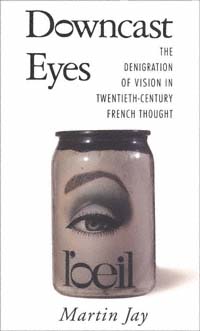 | Title: Downcast eyes: the denigration of vision in twentieth-century French thought Author: Jay, Martin 1944- Published: University of California Press, 1993 Subjects: Philosophy | Intellectual History | French Studies | Literary Theory and Criticism | Art Theory Publisher's Description: Long considered "the noblest of the senses," vision has increasingly come under critical scrutiny by a wide range of thinkers who question its dominance in Western culture. These critics of vision, especially prominent in twentieth-century France, have challenged its allegedly superior capacity to provide access to the world. They have also criticized its supposed complicity with political and social oppression through the promulgation of spectacle and surveillance.Martin Jay turns to this discourse surrounding vision and explores its often contradictory implications in the work of such influential figures as Jean-Paul Sartre, Maurice Merleau-Ponty, Michel Foucault, Jacques Lacan, Louis Althusser, Guy Debord, Luce Irigaray, Emmanuel Levinas, and Jacques Derrida. Jay begins with a discussion of the theory of vision from Plato to Descartes, then considers its role in the French Enlightenment before turning to its status in the culture of modernity. From consideration of French Impressionism to analysis of Georges Bataille and the Surrealists, Roland Barthes's writings on photography, and the film theory of Christian Metz, Jay provides lucid and fair-minded accounts of thinkers and ideas widely known for their difficulty.His book examines the myriad links between the interrogation of vision and the pervasive antihumanist, antimodernist, and counter-enlightenment tenor of much recent French thought. Refusing, however, to defend the dominant visual order, he calls instead for a plurality of "scopic regimes." Certain to generate controversy and discussion throughout the humanities and social sciences, Downcast Eyes will consolidate Jay's reputation as one of today's premier cultural and intellectual historians. [brief] Similar Items |
| 91. | 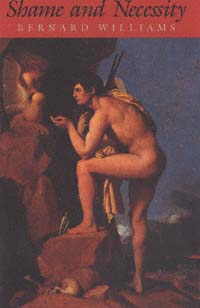 | Title: Shame and necessity Author: Williams, Bernard Arthur Owen Published: University of California Press, 1993 Subjects: Philosophy | Ethics | Classics | Classical Philosophy | Literary Theory and Criticism Publisher's Description: We tend to suppose that the ancient Greeks had primitive ideas of the self, of responsibility, freedom, and shame, and that now humanity has advanced from these to a more refined moral consciousness. Bernard Williams's original and radical book questions this picture of Western history. While we are in many ways different from the Greeks, Williams claims that the differences are not to be traced to a shift in these basic conceptions of ethical life. We are more like the ancients than we are prepared to acknowledge, and only when this is understood can we properly grasp our most important differences from them, such as our rejection of slavery.The author is a philosopher, but much of his book is directed to writers such as Homer and the tragedians, whom he discusses as poets and not just as materials for philosophy. At the center of his study is the question of how we can understand Greek tragedy at all, when its world is so far from ours.Williams explains how it is that when the ancients speak, they do not merely tell us about themselves, but about ourselves. Shame and Necessity gives a new account of our relations to the Greeks, and helps us to see what ethical ideas we need in order to live in the modern world. [brief] Similar Items |
| 92. |  | Title: Practicing virtues: moral traditions at Quaker and military boarding schools Author: Hays, Kim Published: University of California Press, 1994 Subjects: Sociology | Philosophy | Education Publisher's Description: Practicing Virtues is about learning to be good in the distinct moral worlds of Quaker and military boarding schools. Both types of schools bind their communities with shared codes of conduct, the military schools' conservative tradition emphasizing discipline and hard work, the Quaker schools' liberal tradition favoring tolerance and togetherness. At the heart of this contrast are two sets of virtues: pride, loyalty, and leadership among the cadets; simplicity, equality, and concern among the students at Quaker schools.During the course of a year Kim Hays lived in six schools, attending classes and staff meetings, sharing meals and informal conversation, and participating in the nonacademic side of boarding-school life.Despite the outward contrast between the Quaker and military settings, Hays found surprising similarities. Both systems cherish individualism while encouraging group identification and service to the school community. Hays shows that orderliness, obedience, and harmony do not in themselves create a vital moral environment. To reach that goal, teachers, students, and administrators need to disagree, question rules, and fight for change.This book has much to say about the role of education in developing moral responsibility. Every educator, student, and parent who cares about the future of American schooling will find valuable lessons here. [brief] Similar Items |
| 93. | 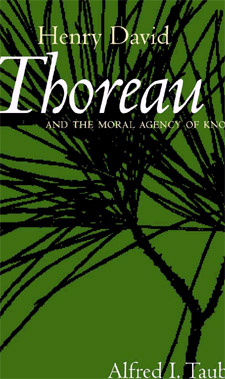 | Title: Henry David Thoreau and the moral agency of knowing Author: Tauber, Alfred I Published: University of California Press, 2001 Subjects: Philosophy | Literature | History and Philosophy of Science | Ethics Publisher's Description: In his graceful philosophical account, Alfred I. Tauber shows why Thoreau still seems so relevant today - more relevant in many respects than he seemed to his contemporaries. Although Thoreau has been skillfully and thoroughly examined as a writer, naturalist, mystic, historian, social thinker, Transcendentalist, and lifelong student, we may find in Tauber's portrait of Thoreau the moralist a characterization that binds all these aspects of his career together. Thoreau was caught at a critical turn in the history of science, between the ebb of Romanticism and the rising tide of positivism. He responded to the challenges posed by the new ideal of objectivity not by rejecting the scientific worldview, but by humanizing it for himself. Tauber portrays Thoreau as a man whose moral vision guided his life's work. Each of Thoreau's projects reflected a self-proclaimed "metaphysical ethics," an articulated program of self-discovery and self-knowing. By writing, by combining precision with poetry in his naturalist pursuits and simplicity with mystical fervor in his daily activity, Thoreau sought to live a life of virtue - one he would characterize as marked by deliberate choice. This unique vision of human agency and responsibility will still seem fresh and contemporary to readers at the start of the twenty-first century. [brief] Similar Items |
| 94. | 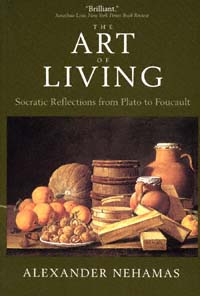 | Title: The art of living: Socratic reflections from Plato to Foucault Author: Nehamas, Alexander 1946- Published: University of California Press, 1998 Subjects: Classics | Classical Philosophy | Classical Literature and Language | Philosophy | Social and Political Thought | Literature Publisher's Description: For much of its history, philosophy was not merely a theoretical discipline but a way of life, an "art of living." This practical aspect of philosophy has been much less dominant in modernity than it was in ancient Greece and Rome, when philosophers of all stripes kept returning to Socrates as a model for living. The idea of philosophy as an art of living has survived in the works of such major modern authors as Montaigne, Nietzsche, and Foucault. Each of these writers has used philosophical discussion as a means of establishing what a person is and how a worthwhile life is to be lived. In this wide-ranging, brilliantly written account, Alexander Nehamas provides an incisive reevaluation of Socrates' place in the Western philosophical tradition and shows the importance of Socrates for Montaigne, Nietzsche, and Foucault.Why does each of these philosophers - each fundamentally concerned with his own originality - return to Socrates as a model? The answer lies in the irony that characterizes the Socrates we know from the Platonic dialogues. Socratic irony creates a mask that prevents a view of what lies behind. How Socrates led the life he did, what enabled or inspired him, is never made evident. No tenets are proposed. Socrates remains a silent and ambiguous character, forcing readers to come to their own conclusions about the art of life. This, Nehamas shows, is what allowed Montaigne, Nietzsche, and Foucault to return to Socrates as a model without thereby compelling them to imitate him.This highly readable, erudite study argues for the importance of the tradition within Western philosophy that is best described as "the art of living" and casts Montaigne, Nietzsche, and Foucault as the three major modern representatives of this tradition. Full of original ideas and challenging associations, this work will offer new ways of thinking about the philosophers Nehamas discusses and about the discipline of philosophy itself. [brief] Similar Items |
| 95. | 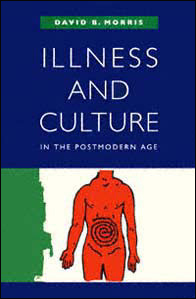 | Title: Illness and culture in the postmodern age Author: Morris, David B Published: University of California Press, 1998 Subjects: Sociology | Philosophy | Medicine | Technology and Society | Anthropology | American Studies Publisher's Description: We become ill in ways our parents and grandparents did not, with diseases unheard of and treatments undreamed of by them. Illness has changed in the postmodern era - roughly the period since World War II - as dramatically as technology, transportation, and the texture of everyday life. Exploring these changes, David B. Morris tells the fascinating story, or stories, of what goes into making the postmodern experience of illness different, perhaps unique. Even as he decries the overuse and misuse of the term "postmodern," Morris shows how brightly ideas of illness, health, and postmodernism illuminate one another in late-twentieth-century culture.Modern medicine traditionally separates disease - an objectively verified disorder - from illness - a patient's subjective experience. Postmodern medicine, Morris says, can make no such clean distinction; instead, it demands a biocultural model, situating illness at the crossroads of biology and culture. Maladies such as chronic fatigue syndrome and post-traumatic stress disorder signal our awareness that there are biocultural ways of being sick.The biocultural vision of illness not only blurs old boundaries but also offers a new and infinitely promising arena for investigating both biology and culture. In many ways Illness and Culture in the Postmodern Age leads us to understand our experience of the world differently. [brief] Similar Items |
| 96. |  | Title: Foregone conclusions: against apocalyptic history Author: Bernstein, Michael André 1947- Published: University of California Press, 1994 Subjects: Philosophy | Jewish Studies | Literature | Literary Theory and Criticism Publisher's Description: Michael André Bernstein's passionate denunciation of apocalyptic thinking provides a moral, philosophical, and literary challenge to the way most of us make sense of our worlds. In our search for coherence, Bernstein argues, we tend to see our lives as moving toward a predetermined fate. This "foreshadowing" demeans the variety, the richness, and especially the unpredictability of everyday life. Apocalyptic history denies the openness and choice available to its actors.Bernstein chooses the Holocaust as the prime example of our tendency toward foregone conclusions. He argues eloquently against politicians and theologians who depict the Holocaust as foreordained and its victims as somehow implicated in a fate they should have been able to foresee. But his argument ranges wider. From recent biographies of Kafka to the Israeli-P.L.O. peace accords, from campus cultural diversity debates to the Crown Heights riots, Bernstein warns against our passive acceptance of historical or personal victimization.An essential contribution to Holocaust studies, this book is also a lucid call to transform the way we read and write history and the way we make sense of our lives. [brief] Similar Items |
| 97. | 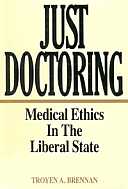 | Title: Just doctoring: medical ethics in the liberal state Author: Brennan, Troyen A Published: University of California Press, 1991 Subjects: Philosophy | Ethics | Medicine Publisher's Description: Just Doctoring draws the doctor-patient relationship out of the consulting room and into the middle of the legal and political arenas where it more and more frequently appears. Traditionally, medical ethics has focused on the isolated relationship of physician to patient in a setting that has left the physician virtually untouched by market constraints or government regulation. Arguing that changes in health care institutions and legal attention to patient rights have made conventional approaches obsolete, Troyen Brennan points the way to a new, more aware and engaged medical ethics.The medical profession is no longer isolated, even theoretically, from the liberal, market-dominated state. Old ideas of physician beneficence and altruism must make way for a justice-based medical ethics, assuming a relationship between equals more compatible with liberal political philosophy. Brennan offers clinical examples of many of today's most challenging medical problems - from informed consent to care rationing and the repercussions of the HIV epidemic - and gives his recommendation for a new ethical perspective. This lively and controversial plea for a rethinking of medical ethics goes right to the heart of medical care at the end of the twentieth century. [brief] Similar Items |
| 98. | 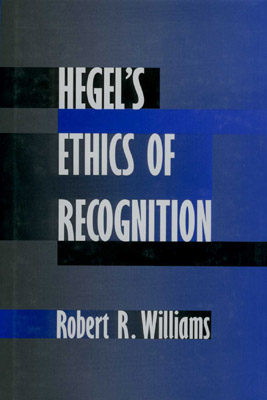 | Title: Hegel's ethics of recognition Author: Williams, Robert R 1939- Published: University of California Press, 1998 Subjects: Philosophy | Ethics Publisher's Description: In this significant contribution to Hegel scholarship, Robert Williams develops the most comprehensive account to date of Hegel's concept of recognition ( Anerkennung ). Fichte introduced the concept of recognition as a presupposition of both Rousseau's social contract and Kant's ethics. Williams shows that Hegel appropriated the concept of recognition as the general pattern of his concept of ethical life, breaking with natural law theory yet incorporating the Aristotelian view that rights and virtues are possible only within a certain kind of community.He explores Hegel's intersubjective concept of spirit ( Geist ) as the product of affirmative mutual recognition and his conception of recognition as the right to have rights. Examining Hegel's Jena manuscripts, his Philosophy of Right , the Phenomenology of Spirit , and other works, Williams shows how the concept of recognition shapes and illumines Hegel's understandings of crime and punishment, morality, the family, the state, sovereignty, international relations, and war. A concluding chapter on the reception and reworking of the concept of recognition by contemporary thinkers including Derrida, Levinas, and Deleuze demonstrates Hegel's continuing centrality to the philosophical concerns of our age. [brief] Similar Items |
| 99. | 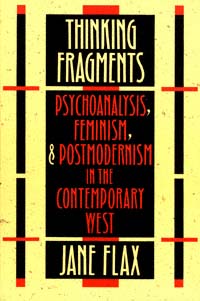 | Title: Thinking fragments: psychoanalysis, feminism, and postmodernism in the contemporary West Author: Flax, Jane Published: University of California Press, 1990 Subjects: Gender Studies | Psychiatry | Political Theory | Literary Theory and Criticism Publisher's Description: Thinking Fragments provides a brilliant critique of psychoanalytic, feminist, and postmodern theory. Examining the writings of Freud, Winnicott, Lacan, Chodorow, Irigaray, Derrida, Rorty, and Foucault, among others, Flax conducts a "conversation" among psychoanalysts, feminist thinkers, and postmodern theorists, evaluating the ways in which each group of thinkers succeeds in coming to terms with crises in contemporary Western culture. As she analyzes each theory in turn, the others are used to identify and interrogate its gaps and omissions. The result is a postmodern text of intertwined ideas, devoid of clear beginnings, endings, conclusions.Flax addresses the question, "how is it possible to theorize in the contemporary West?" With the demise of objective notions of truth, knowledge, self and power, intellectuals have devised these new modes of thinking which both reflect and contribute to the uncertainties of the contemporary West. Each also addresses at least one aspect of what has become most problematic to modern individuals: How to come to terms with self, gender, knowledge and power without resorting to concepts that stress objectivity, universal knowledge, and a unitary self.Flax finds that neither psychoanalysis, nor feminism, nor postmodernism is adequate to the task for which it was conceived. Each can illuminate certain aspects of problems of self, gender, knowledge, and power, but none is sufficient on its own. In fact, each incorporates characteristic blindnesses rooted in part in the very difficulties it addresses. Despite their failures, Flax concludes that these modes of theorizing are our best tools thus far, compelling us to use them even while we grapple with the problems they raise. Thinking Fragments is a wide-ranging study that will elicit much discussion and debate. It is an essential text for social scientists and humanists alike, as well as anyone else who thinks about how to "do" theory in the contemporary West. [brief] Similar Items |
| 100. |  | Title: In the shadow of catastrophe: German intellectuals between apocalypse and enlightenment Author: Rabinbach, Anson Published: University of California Press, 1997 Subjects: History | German Studies | Social and Political Thought | Philosophy Publisher's Description: These essays by eminent European intellectual and cultural historian Anson Rabinbach address the writings of key figures in twentieth-century German philosophy. Rabinbach explores their ideas in relation to the two world wars and the horrors facing Europe at that time.Analyzing the work of Benjamin and Bloch, he suggests their indebtedness to the traditions of Jewish messianism. In a discussion of Hugo Ball's little-known Critique of the German Intelligentsia , Rabinbach reveals the curious intellectual career of the Dadaist and antiwar activist turned-nationalist and anti-Semite. His examination of Heidegger's "Letter on Humanism" and Jaspers's The Question of German Guilt illuminates the complex and often obscure political referents of these texts. Turning to Horkheimer and Adorno's Dialectic of Enlightenment , Rabinbach offers an arresting new interpretation of this central text of the critical theory of the Frankfurt School. Subtly and persuasively argued, his book will become an indispensable reference point for all concerned with twentieth-century German history and thought. [brief] Similar Items |